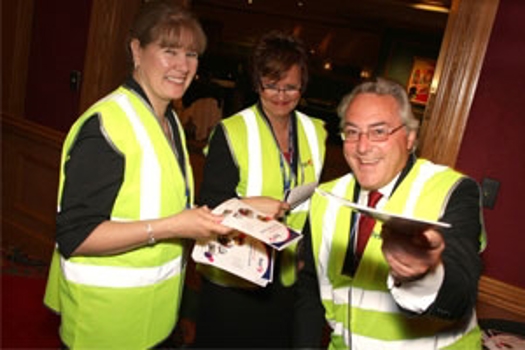THE CHALLENGE
Co-operative Financial Services (CFS) completely restructured its customer contact centre in 2006 with new systems, leadership, processes and business targets. The organisation wanted to improve its customer service by creating a shift in culture, by changing behaviour and promoting a new style of leadership. The ultimate aim was to improve both customer and staff retention. Call centre agents' (CCAs) previous training had focused on products and processes. There were guidelines for building rapport but these concentrated on the 'what' of customer service rather than the 'how'. As CCAs can be called upon to deal with queries on high street and internet banking, mortgages, credit cards, loans, pensions, unit trusts and insurance, as well as financial advice, CFS realised they needed more techniques backed by a positive mindset and culture.
THE PROGRAMME
The Positive Programme was designed and delivered by learning solutions provider Academee and has three separate elements: Talking Positive; Selling Positive; Keeping Positive.
Talking Positive was introduced to managers, while a one-day core training programme for 900 CCAs was carried out a month later. Team and customer service managers also attended a leadership skills workshop. CCAs learned how to 'guide' a call, how to listen, ask questions, acknowledge and respond, to upsell, as well as how to handle conflict. Selling Positive was delivered to the sales and renewals team in four half-day sessions, while team managers also attended a two-day workshop. Keeping Positive involved three days of training on customer retention for two newly formed teams.
All the training was delivered in groups of approximately 12 staff, and a 'train-the-trainer' element enabled staff to provide ongoing training and support. The courses were built around role-plays, discussion and coaching, with workbooks to keep for reference. Selling Positive participants also got a DVD and interactive PowerPoint mini-sessions.
While all of this was going on, posters and other reminders around the contact centre helped to create a feeling of excitement.
THE RESULTS
Results so far have been impressive. "The Positive Programme has had a significant impact on performance," says Ann-Marie Stagg, head of insurance services. Independent consumer intelligence research has also shown CFS as the highest improver for sales techniques among 37 major competitors in the general insurance sectors, while the Keeping Positive training has helped the new retention teams save more than £1.8 million of business. One of the biggest signs of the programme's success is that other businesses within the group are also considering implementing it.
THE MANAGER'S VIEW
Ann-Marie Stagg is head of insurance services. "The Positive Programme has created a real buzz throughout CFS," says Stagg. "Across the contact centre, you can see not only all the branding, but you also hear it talked about everywhere; it has ignited a cultural change. The post-programme questionnaires scored it extremely highly. The 'Big Brother-style' diary room set up for participants to record their feedback was overwhelmingly positive, she adds. "People were literally queuing up to do this," Stagg says "The branding was successful during the launch period and we've now taken it one stage further. We've also added several hints and tips to our intranet to help with positive call handling. Tony Blair actually visited the contact centre during 'Talking Positive'. He was really interested in it and one of our team managers has now created a poster of his own - 'Talking Positive, as endorsed by Tony Blair'. The programme is not just a one-off. We're talking about creating a fundamental culture change and you can't do that overnight."
THE EMPLOYEE'S VIEW
Nicoletta Frattasi-Lane is a team leader.
"The training was totally different from anything we had done before," she enthuses. "It gave us pointers we could take on board personally as well as professionally. The whole process was about self-realisation - how the words we use can have such an impact on the person we're talking to and on ourselves. It made me feel 'I can do this. And I can be helpful and energise myself'. It has made a 100% difference to how I feel about work." She admits some people are still a little sceptical but even they have had some of it rub off on them. "In this job, repeat calls can be quite boring," she points out, "but the impact you can have by the words and tone you use can make such a difference. I have found my ability to deal with complaints has improved - you realise how to handle someone who is upset and calling for a reason. At first it is something you have to make a conscious effort to do but practice makes it come naturally and that feels really good. Everyone should do this sort of training, and not just for their job."







